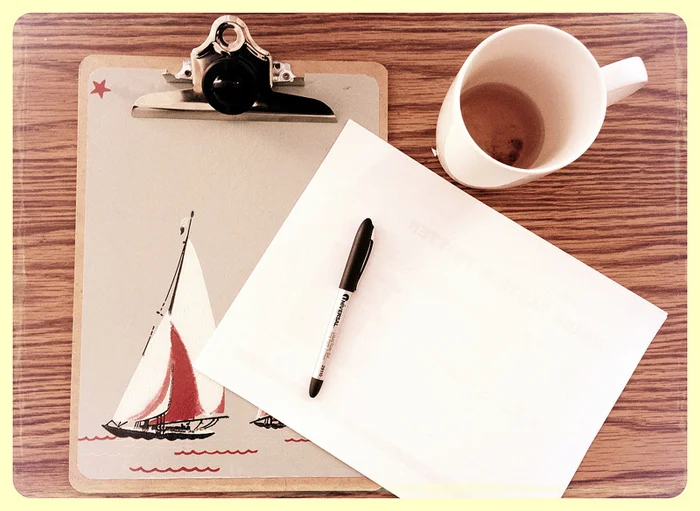5 Productivity Tips From Crazy Ad Agency Life

I work at an advertising agency, a type of business that, in my friend’s words, “I work at because I’m too ADD to do anything else.”
Clients are aplenty, industries are diverse and many days I look at my timesheet in awe when I realize I’ve worked on ten projects in a single day.
The greatest thing I’ve learned from ad agency life is efficiency. Productivity. Mad-deliverables turned around in record time all while maintaining high standards.
You would think that my love for the internet would mean that I have some crazy enterprise app that keeps my tasks digitized.
But I don’t.
I have a pen and paper and a philosophy that fancy productivity programs sometimes just add another layer of technology between you and the task at hand.
I’ve created a simple system with five parts that keeps my days clear and creative. No fancy iPhone apps, no multi-tabbed spreadsheets, just a clipboard, a pen, scratch paper and a whole lot of Jasmine tea. Here it is.
Two to-do lists
I create one master mermaid to-do list and one daily to-do list. The master to-do list is long, often dozens of items deep with projects that need to get done in the next week, month or year.
The daily to-do list plucks the most pressing projects from the master to-do list and breaks them down into bite-sized tasks that can be completed that day. I throw away my daily to-do list every 24 hours, so nothing goes on it that can’t be accomplished in a single day.
I staple my master to-do list on my mermaid bulletin board wall and continue to add to it as projects come. I usually rewrite it monthly to keep it neat.
These two lists compliment one another. Any big project takes dozens of tiny tasks to get done, and the daily to-do list makes sure that I’m edging closer and closer to finishing that big project.
Plan your day at the end of the day
I take the last twenty minutes of each day to evaluate how far I’ve gotten on my priorities and then build out my daily to-do list for the next day.
It’s a good daily exercise to check-in on priorities and push back any tasks that have bubbled up but aren’t of top importance. At agencies, things always come up last minute, but the key to staying on track is knowing when to delegate that last minute ask to the next day, when you actually have time.
I create my daily to do list the night before, so I can glide into work the next day, land at my desk and immediately dive into work.
Inbox zero
I scrub my inbox until it’s completely void of any lingering messages - absolute zero - at least once a week. In my dream-world, I do this daily, but often I don’t get to read every email everyday, so weekly is much more controllable for me. Part of achieving inbox zero is having an awesome to-do list so your email doesn’t become your to-do list, so don’t even attempt inbox zero until you have #1 down pat.
Book three hour meetings. With yourself.
Working in any fast paced environment often includes interruptions which can throw off your whole day. The result? Very little down time to actually “think” and create the big, earth-shattering work that will ultimately make you valuable.
Studies show that the only way to produce awesome, groundbreaking work is to have pure, uninterrupted time to think and work for hours on end, something that becomes nearly impossible when you’re interrupted constantly.
To fight the interruptions, I book a three-hour standing meeting with myself every week. I use this time to innovate a new approach to my work, come up with a big idea or to unearth a project that needs to be finished. During the weeks that get particularly crazy, this is the only time I have to get in flow and exercise my creative brainpower, so it’s essential that this three-hour time block gets preserved.
All other meetings, 45 minutes
I try to keep meetings at 30 minutes or less. Usually I book meetings for 45 minutes to allocate for latecomers, introductions and the typical next step discussions at the end. If meetings start digressing, I steer them back on track or end early - it becomes obvious when more work needs to be done before everyone is re-introduced to the task.
